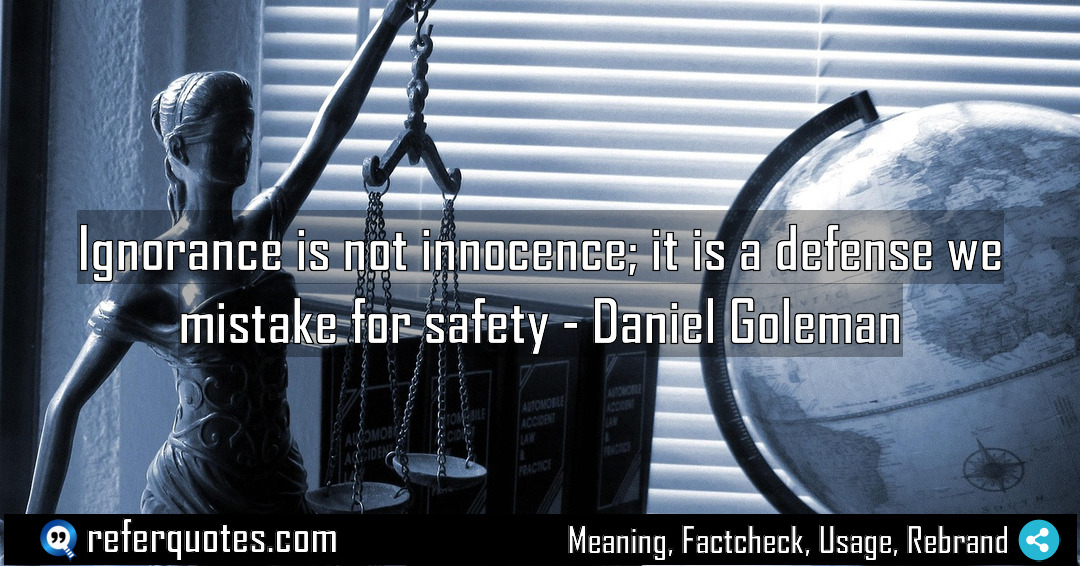You know, “Ignorance is not innocence” is one of those lines that just sticks with you. It’s a powerful reminder that what we don’t know can actually be a choice, a defense mechanism we use to avoid uncomfortable truths. It’s not about being naive; it’s about actively building a wall for our own perceived safety.
Share Image Quote:Table of Contents
Meaning
At its core, this quote dismantles the comforting idea that not knowing something absolves us of responsibility. It argues that ignorance is often a deliberate, self-protective strategy, not a state of blamelessness.
Explanation
Let me break this down for you. We all do this. We turn a blind eye to the difficult stuff—a problem in a relationship, a red flag at work, a hard truth about our own health. We tell ourselves, “I didn’t know, so it’s not my fault.” But Goleman hits the nail on the head. That “not knowing” is a defense. It’s a psychological wall we build because confronting the reality feels too threatening, too painful. We mistake the comfort of that wall for actual safety, when in reality, it’s just a temporary shelter that often makes the eventual problem much, much worse. It’s a form of self-deception, plain and simple.
Quote Summary
| Context | Attributes |
|---|---|
| Original Language | English (3668) |
| Category | Wisdom (385) |
| Topics | ignorance (10), safety (24), truth (77) |
| Literary Style | aphoristic (181) |
| Emotion / Mood | reflective (382), serious (155) |
| Overall Quote Score | 81 (258) |
Origin & Factcheck
This gem comes directly from Daniel Goleman’s 1985 book, Vital Lies, Simple Truths: The Psychology of Self-Deception. It’s a deep dive into how our minds protect us from anxiety. You might sometimes see this sentiment floating around misattributed to poets or other philosophers, but its true home is in Goleman’s work on psychology.
Attribution Summary
| Context | Attributes |
|---|---|
| Author | Daniel Goleman (125) |
| Source Type | Book (4032) |
| Source/Book Name | Vital Lies, Simple Truths: The Psychology of Self-Deception (61) |
| Origin Timeperiod | Modern (530) |
| Original Language | English (3668) |
| Authenticity | Verified (4032) |
Author Bio
Daniel Goleman is a psychologist and bestselling author whose journalism at The New York Times brought brain and behavior science to a wide audience. He earned a BA from Amherst and a PhD in psychology from Harvard, and studied in India on a Harvard fellowship. Goleman’s research and writing helped mainstream emotional intelligence, leadership competencies, attention, and contemplative science. He co-founded CASEL and a leading research consortium on EI at work. The Daniel Goleman book list includes Emotional Intelligence, Working with Emotional Intelligence, Primal Leadership, Social Intelligence, Focus, and Altered Traits.
| Official Website
Where is this quotation located?
| Quotation | Ignorance is not innocence; it is a defense we mistake for safety |
| Book Details | Publication Year: 1985; ISBN: 9780743240156; Last edition: 1996 Harper Perennial; Number of pages: 288. |
| Where is it? | Approximate page from 1996 edition, Chapter 2: The Ecology of Mind |
